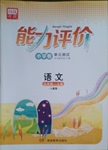题目内容
1 . About 30 million yuan for the typhoon-stricken areas in Taiwan by now. (collect) 迄今为止,为台湾受台风袭击灾区的捐款已达到三千万元。 |
1. has been collected考查现在完成时的被动语态., by now迄今为止,应用完成时,另外,本题还考查了主谓一致。当主语是表示时间、距离、金钱的数字时,谓语动词应用单数。

练习册系列答案
 能力评价系列答案
能力评价系列答案 唐印文化课时测评系列答案
唐印文化课时测评系列答案
相关题目